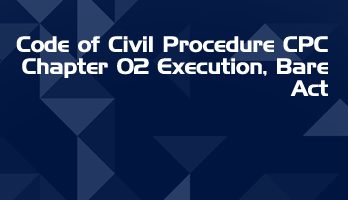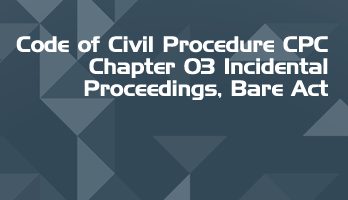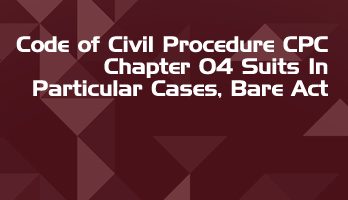A 'Bare act' is the actual legislation passed by the Parliament of India. Generally, an act sets out the high level legal and policy principles applicable to the subject matter of the law.
Most acts are accompanied by 'subsidiary legislation' such as rules, regulations, notifications and orders; which address the actual implementation detail of the act.
Free Full Course Available on LawMint's YouTube Channel
How to Land Your Dream LLB Internship in a Top Law Firm
- Part 1 - Introduction
- Part 2 - Internship Planning
- Part 3 - Internship Research
- Part 4 - Building Your Profile
- Part 5 - The Email
- Part 6 - The Resume
- Part 7 - The Cover Letter
- Part 8 - The Interview
- Part 9 - Self Development
Practical and comprehensive course, with real examples and step-by-step analysis of the complete internship application process. Check out LawMint's YouTube channel now!
Negotiable Instruments Act, 1881
Chapter VII – Of Discharge from Liability on Notes, Bills and Cheques
Section 82 – Discharge from liability
The maker, acceptor or indorser respectively of a negotiable instrument is discharged from liability thereon:
- by cancellation; to a holder thereof who cancels such acceptor’s or indorser’s name with intent to discharge him, and to all parties claiming under such holder;
- by release; to a holder thereof who otherwise discharges such maker, acceptor or indorser, and to all parties deriving title under such holder after notice of such discharge;
- by payment,to all parties thereto, if the instrument is payable to bearer, or has been indorsed in blank, and such maker, acceptor or indorser makes payment in due course of the amount due thereon.
Section 83 – Discharge by allowing drawee more than forty – eight hours to accept
If the holder of a bill of exchange allows the drawee more than forty – eight hours, exclusive of public holidays, to consider whether he will accept the same, all previous parties not consenting to such allowance are thereby discharged from liability to such holder.
Section 84 – When cheque not duly presented and drawer damaged thereby.
Where a cheque is not presented for payment within a reasonable time of its issue, and the drawer or person on whose account it is drawn had the right, at the time when presentment ought to have been made, as between himself and the banker, to have the cheque paid and suffers actual damage through the delay, he is discharged to the extent of such damage, that is to say, to the extent to which such drawer or person is a creditor of the banker to a larger amount than he would have been if such cheque had been paid. In determining what is a reasonable time, regard shall be had to the nature of the instrument, the usage of trade and of bankers, and the facts of the particular case. The holder of the cheque as to which such drawer or person is so discharged shall be a creditor, in lieu of such drawer or person, of such banker to the extent of such discharge and entitled to recover the amount from him.
Illustrations
- A draws a cheque for Rs. 1,000 and, when the cheque ought to be presented, has funds at the bank to meet it. The bank fails before the cheque is presented. The drawer is discharged, but the holder can prove against the bank for the amount of the cheque.
- A draws a cheque at Ambala on a bank in Calcutta. The bank fails before the cheque could be presented in ordinary course. A is not discharged, for he has not suffered actual damage through any delay in presenting the cheque.
Section 85 – Cheque payable to order.
Where a cheque payable to order purports to be endorsed by or on behalf of the payee, the drawee is discharged by payment in due course. Where a cheque is originally expressed to be payable to bearer, the drawee is discharged by payment in due course to the bearer thereof, notwithstanding any endorsement whether in full or in blank appearing thereon, and notwithstanding that any such endorsement purports to restrict or exclude further negotiation.
Section 85A – Drafts drawn by one branch of a bank on another payable to order
Where any draft, that is, an order to pay money, drawn by one office of a bank upon another office of the same bank for a sum of money payable to order on demand, purports to be endorsed by or on behalf of the payee, the bank is discharged by payment in due course.
Section 86 – Parties not consenting discharged by qualified or limited acceptance
If the holder of a bill of exchange acquiesces in a qualified acceptance, or one limited to part of the sum mentioned in the bill, or which substitutes a different place or time for payment, or which, where the drawees are not partners, is not signed by all the drawees, all previous parties whose consent is not obtained to such acceptance are discharged as against the holder and those claiming under him, unless on notice given by the holder they assent to such acceptance.
Explanations
An acceptance is qualified:
- where it is conditional, declaring the payment to be dependent on the happening, of an event therein stated;
- where it undertakes the payment of part only of the sum ordered to be paid;
- where no place of payment being specified on the order, it undertakes the payment at a specified place, and not otherwise or elsewhere; or where, a place of payment being specified in the order, it undertakes the payment at some other place and not otherwise or elsewhere;
- where it undertakes the payment at a time other than that at which under the order it would be legally due.
Section 87 – Effect of material alteration
Alteration by indorsee. Any material alteration of a negotiable instrument renders the same void as against any one who is a party thereto at the time of making such alteration and does not consent thereto, unless it was made in order to carry out the common intention of the original parties. Alteration by indorsee. And any such alteration, if made by an indorsee, discharges his indorser from all liability to him in respect of the consideration thereof. The provisions of this section are subject to those of sections 20, 49, 86 and 125.
Section 88 – Acceptor or indorser bound notwithstanding previous alteration
An acceptor or indorser of a negotiable instrument is bound by his acceptance or indorsement notwithstanding any previous alteration of the instrument.
Section 89 – Payment of instrument on which alteration is not apparent
- Where a promissory note, bill of exchange or cheque has been materially altered but does not appear to have been so altered, or where a cheque is presented for payment which does not at the time of presentation appear to be crossed or to have had a crossing which has been obliterated, payment thereof by a person or banker liable to pay, and paying the same according to the apparent tenor thereof at the time of payment and otherwise in due course, shall discharge such person or banker from all liability thereon; and such payment shall not be questioned by reason of the instrument having been altered or the cheque crossed.
- Where the cheque is an electronic image of a truncated cheque, any difference in apparent tenor of such electronic image and the truncated cheque shall be a material alteration and it shall be the duty of the bank or the clearing house, as the case may be, to ensure the exactness of the apparent tenor of electronic image of the truncated cheque while truncating and transmitting the image.
- Any bank or a clearing house which receives a transmitted electronic image of a truncated cheque, shall verify from the party who transmitted the image to it, that the image so transmitted to it and received by it, is exactly the same.
Section 90 – Extinguishment of rights of action on bill in acceptor’s hands
If a bill of exchange which has been negotiated is, at or after maturity, held by the acceptor in his own right, all rights of action thereon are extinguished.
Important Central Acts in Regional Languages
Legislative department website also features regional language versions of several important Central Acts.
Free Full Course Available on LawMint's YouTube Channel
How to Land Your Dream LLB Internship in a Top Law Firm
- Part 1 - Introduction
- Part 2 - Internship Planning
- Part 3 - Internship Research
- Part 4 - Building Your Profile
- Part 5 - The Email
- Part 6 - The Resume
- Part 7 - The Cover Letter
- Part 8 - The Interview
- Part 9 - Self Development
Practical and comprehensive course, with real examples and step-by-step analysis of the complete internship application process. Check out LawMint's YouTube channel now!












